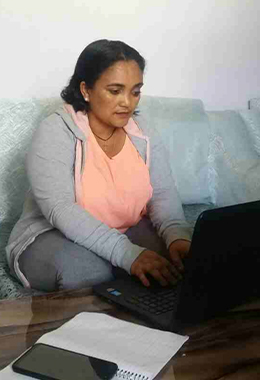In Ethiopia, Messaging App Keeps Educators Connected during Pandemic

Bonchiwosen Tsegaw is an instructor at Gondar College of Teachers Education in Ethiopia. She’s been a teacher for 18 years, but this year has been like no other. When schools and universities closed in March 2020 due to the coronavirus pandemic, Tsegaw faced a new reality—no classrooms to teach, no students to engage, no fellow educators to collaborate with. It felt lonely and isolating.
“We were always at home, which can be very depressing,” Tsegaw recalls. “Although we read and tried to keep ourselves busy, we were not sharing what we were reading with our students and colleagues. I missed my job.”
Fortunately, a virtual group created by EDC through the Ethiopia READ II literacy program is keeping Tsegaw and educators like her connected and learning during the pandemic. “We wanted to support our instructors in the Mother Tongue Department to not feel isolated during this COVID-19 time,” says EDC’s Lishan Kassa, READ II’s preservice teacher training specialist.
Ethiopia-Educator.jpg

Since launching READ II in 2018, EDC and lead implementer Creative Associates have worked with partner organizations and the Ethiopian Ministry of Education to improve the reading proficiency of 15 million children. READ II provides techniques and materials to primary teachers and college instructors in six regions where seven mother tongue languages are spoken.
In April 2020, EDC and the READ II team created the Knowledge Exchange Group (KEG) on the free cloud-based messaging app Telegram to keep instructors connected during the pandemic. After testing different apps among a small group of READ II participants, the team found Telegram to be the simplest, most accessible platform to host more than 50 instructors in the sharing of teacher training strategies and materials, and the facilitation of robust discussion.
“EDC adapted in-person workshop resources into e-training materials so they could be posted on Telegram,” Kassa explains. “Then, an EDC facilitator engaged instructors on the KEG twice a week to review materials and exchange views, best practices, materials, and lessons learned.”
READ II instructors selected the themes they most wanted to learn about and discuss in the KEG, including social and emotional learning and how to teach reading and writing in mother tongue languages. Active facilitation of the KEG ended in October, though the learning community remains open to educators.
The KEG enabled Ethiopia’s READ II college instructors to continue engaging in professional development—and to forge connections with each other across institutions. Banchiwosen, an Amharic-language teacher, says the virtual platform gives everyone a chance to participate.
“In our [in-person] training sessions, we might choose a representative and not all get a chance to speak,” Tsegaw says. “In this KEG, everyone can share their thoughts with the entire group. It’s also great to use a new technology.” And the connections to her peers have been vital. “It’s great to share our ideas with colleagues we don’t know personally.”
Tsegay Gebrelibanos, who teaches at Adwa College of Teacher Education and a member of the college leadership, echoes those sentiments. “As instructors, we are usually very busy,” says Gebrelibanos, a teacher for 20 years. “So sitting at home can be depressing. The KEG has been great for me because I like to discuss and debate academia. I also like that the program is trainee-centered, just like the student-centered approach we use to teach. This encourages participants to think independently and reflect on their own ideas.”
Gebrelibanos, who teaches in the Tigringa language, says connecting with other READ II educators in the KEG has helped him think about how he develops his own course materials. “I’m working on writing supplementary materials for teaching in Tigringa,” Gebrelibanos says, noting that an article on pre-reading strategies shared in the KEG was especially interesting. “I’ve learned so much in the group. I’d like to thank the facilitator and coordinators for pushing us even further to think about additional ideas we can bring to the discussion.”
Over the last three years, READ II has worked with 32 Colleges of Teacher Education and more than 600 mother tongue teachers and English instructors to strengthen instructional approaches; improve early-grade reading skills; and build a culture of reading in families, schools, and communities. As the preservice part of the program draws to a close and Ethiopia’s schools begin to reopen, Kassa hopes the Ministry of Education and Regional Education Bureaus will be able to keep the teachers’ KEG on Telegram alive.
“We’ve created a friendly atmosphere to discuss themes related to the teaching of reading in mother tongue, gender-responsive pedagogy, social-emotional learning, and more,” Kassa says. “We hope instructors will continue using the KEG even after the program ends.”